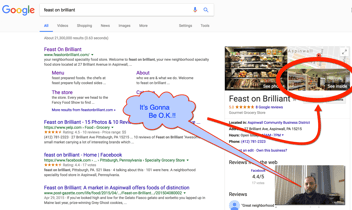Google Knowledge Graph is an entirely new method of delivering organic search results that Google is rolling out over the next few days. In fact, depending on where you are, you may already be using this new tool. But while the Knowledge Graph is likely to make users quite happy if implemented properly, there are many people who are questioning whether this will change critical elements of search marketing - especially SEO. In order to make this determination for yourself, you'll need to understand what the Google Knowledge Graph is all about.
Google Knowledge Graph is designed to provide real facts and data related to a search query instead of a page full of links. This means that Google is making an attempt to show you all of the basic data related to your search instantly instead of requiring you to click the links the search engine delivers and find out for yourself if there is viable data contained on the referenced page.
This is an interesting strategy considering that of all the complaints users have with Google, the biggest is that the results returned for search queries aren't always very good. So how will Google attempt to give you a ton of related information on the front page? For starters, the search giant partnered with Wikipedia to deliver information and resources. Here's how it works:
Let's assume a user searches for George Washington, and they're looking for results on the first American president. In the past, you'd be provided with a selection of 10 links on the first page. Some or none of these could be related to what you want; you might see results for George Washington Bridge, George Washington University, etc. Google's Knowledge Graph will aid the user by doing 2 things:
1.) Returning personalized results that will correctly guess the user is looking for the president
2.) In the sidebar to the right, Google will serve images of the first president, his dates of birth, death and years in office, notable achievements, a short biography, paintings of the man, and possibly information about his family or the American Revolution. All of this on the first page of results.
So what does this mean for SEO? It's hard to say at this point, but it seems logical to suggest that many sites will suddenly see a reduction in traffic because some searchers will get all of the information they need right on the home page of Google results. Therefore, they won't need to (in a lot of cases) click through to any underlying site.
In the past it seems that Google's method of operating was essentially forcing nearly every website in the world to become a prolific producer of content in order to rank for their chosen keywords. Now, the game seems to be changing with the Knowledge Graph. Instead of simply serving your content, Google will now become the source of content. Therefore, even if you are producing high quality content, it may result in less conversions and a lower ROI because people simply won't be going to your site to see information that they can get right away with a simple search.
Of course, the Knowledge Graph probably isn't going to cause many problems for sites targeting commercial keywords like Pittsburgh SEO or Web Design or Social Media. At this time we have no reason to suspect that Google has enough "basic information" to return much of anything relevant to terms like this from a broad standpoint. However, as this new search feature rolls out we'll learn more and report back to you here.
Concerned about how your site might be affected? Call us now for an immediate consultation, and we'll design a custom plan to get you the traffic and conversions you need - with or without Google. Time is money, so call now.





